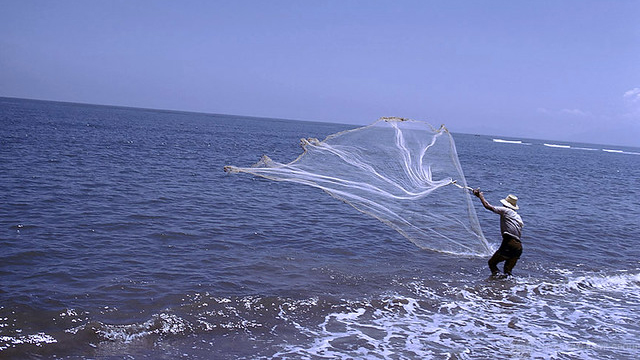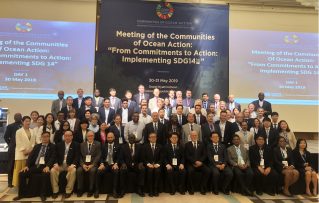
Experts urge more partnerships, engagement for ocean action at Korea meeting
To ensure a healthy and resilient ocean, more urgent partnership is needed, particularly from the private and scientific sectors and for Africa, said ocean experts gathered for a meeting of the Communities of Ocean Action (COAs) that aimed to identify gaps, good practices and lessons learned in the implementation of Sustainable Development Goal 14 (SDG 14) to sustainably use and manage the ocean.
The two-day meeting, organized by UN DESA in Incheon, Republic of Korea, under the theme “From Commitments to Action: Implementing SDG 14,” brought together nearly 100 global representatives of governments and organizations that have registered voluntary commitments for SDG 14 on a database launched at the 2017 UN Ocean Conference. The nine thematic multi-stakeholder COAs were created to follow up on the implementation of these commitments and include groups for ocean acidification and coral reefs, among others.
Participants from governments, civil society, academia and the UN system shared updates on the progress of their commitments and took part in a series of dialogues meant to spark new partnerships and commitments to implement SDG 14.
The meeting came just weeks after the UN General Assembly agreed to hold the next UN Ocean Conference in Lisbon, Portugal, from 2-6 June 2020, co-hosted by Kenya and Portugal. UN Secretary-General António Guterres recently appointed Liu Zhenmin, UN DESA Under-Secretary-General for Economic and Social Affairs, to serve as Conference Secretary-General, and Miguel de Serpa Soares, Under-Secretary-General for Legal Affairs, as Special Adviser to the Presidents of the Conference. The Secretary-General requested that Peter Thomson, his Special Envoy for the Ocean, continue to lead the organization’s advocacy and public outreach efforts to galvanize political momentum, mobilize action and raise ambition on the implementation on SDG 14.
Speaking at the Incheon meeting, Mr. Liu said: “I am confident that the Communities of Ocean Action can help achieve synergies among these voluntary commitment holders and make significant contributions to the 2020 Ocean Conference, inter alia, by providing updates on their implementation and generating new voluntary commitments in support of Goal 14. The importance of the Communities of Ocean Action is underlined by the fact that we cannot accomplish the 2030 Agenda without multi-stakeholder partnerships.”
Underscoring this focus on partnerships, a special event at the meeting called the “VC Café” provided participants with an opportunity to display information about their ocean initiatives, allowing for in-depth networking with an eye toward partnering on future commitments for SDG 14.
 “Through inclusivity, sharing and convening of best expertise in their area of competence, the Communities of Ocean Action have proved themselves to be a vital cog in the wheel driving SDG14 implementation and the UN Ocean Conferences that support SDG14,” said Mr. Thomson, the Special Envoy for the Ocean.
“Through inclusivity, sharing and convening of best expertise in their area of competence, the Communities of Ocean Action have proved themselves to be a vital cog in the wheel driving SDG14 implementation and the UN Ocean Conferences that support SDG14,” said Mr. Thomson, the Special Envoy for the Ocean.
Calling the declining health of the ocean a “defining challenge for our generation,” Yangsoo Kim, Vice Minister at the Ministry of Ocean and Fisheries for the Republic of Korea, said: “We must not give up or lose hope. In this vein, this meeting for discussions on healthier and cleaner oceans by all stakeholders will be just one small step but one great leap for mankind.”
As 31 May is National Oceans Day in the Republic of Korea, Mr. Kim said the country would announce a “Marine Plastic Zero” initiative to reduce plastic pollution. The initiative ties in with some of the meeting participants’ comments that stakeholders collectively should leverage recent media attention on plastics to other forms of ocean pollution.
For its part, the Vice Mayor of the meeting’s host city Incheon said the coastal city would work more actively to realize its vision of becoming more ecologically sustainable.
“We will join the international community’s efforts in pursuing a sustainable marine environment through active environment protection and conservation of the oceans and wetlands, and creating a marine-friendly urban environment,” said Jong-sik Heo, Vice Mayor of Incheon Metropolitan City.
Finally, UN DESA launched a streamlined, easy-to-navigate redesign of its popular oceanconference.un.org website at a session dedicated to beginning a communications strategy for the 2020 UN Ocean Conference. The revised site will serve as a hub for sharing information about global ocean action towards SDG 14 implementation and makes it easier to register a voluntary commitment and register for the Ocean Action Newsletter. It will also host necessary information about the 2020 conference as it becomes available.
In sum, participants valued this opportunity to see examples of tangible progress on SDG 14.
“My takeaway from this meeting is there’s hope,” says Angelique Pouponneau, CEO of the Seychelles Conservation and Climate Adaptation Trust. “To see all the stakeholders in the same room, saying what they are doing—whether it has been financing mechanisms, whether it has been community, whether it’s been indigenous people, whether it’s been governments—its been very reassuring and I go home with a sentiment of hope that things will get better and we will achieve SDG 14.”
About the Communities of Ocean Action
The UN has launched nine thematic multi-stakeholder Communities of Ocean Action (COAs) to follow up on the implementation of the voluntary commitments made at the 2017 UN Ocean Conference—a growing list that now includes more than 1,500 pledges. These groups facilitate collaboration among different actors in support of Sustainable Development Goal 14, Life Below Water, while also having positive impacts on other SDGs. Each community is coordinated by designated focal points who work together with the UN Secretary-General’s Special Envoy for the Ocean, Ambassador Peter Thomson, and UN DESA, in carrying out the activities.
The nine Communities of Ocean Action are: coral reefs; implementation of international law as reflected in the UN Convention on the Law of the Sea; mangroves; marine and coastal ecosystems management; marine pollution; ocean acidification; scientific knowledge, research capacity development and transfer of marine technology; sustainable blue economy; and sustainable fisheries.
Photo: Edwin Huffman / World Bank

Follow Us